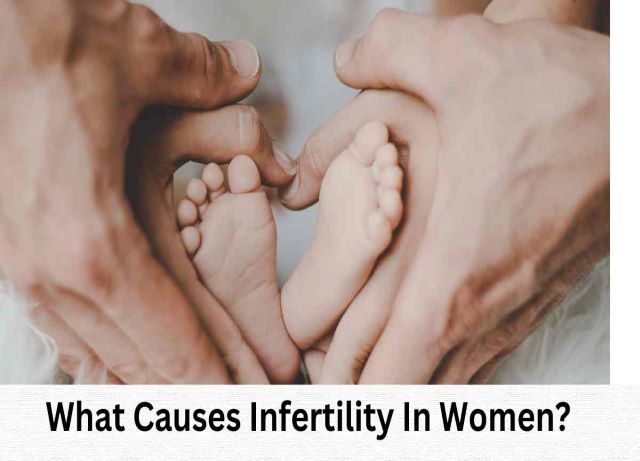Are you facing problems trying to get pregnant? Getting pregnant and trying to carry a pregnancy to its term are both extremely difficult processes. Several things could go wrong throughout these processes that could result in infertility. You see, female infertility is the inability to become pregnant and carry a healthy pregnancy. This is usually diagnosed after a woman has attempted to become pregnant for twelve months without success. Thankfully, there are many infertility treatment options, including medications to address hormonal issues, surgery to address physical issues, and in vitro fertilisation (IVF). But what exactly causes women to be infertile?
In this article, let’s take a walk through the causes of infertility in women and some treatment options available.

What Is Infertility?
An inability to conceive after one year of trying is known as infertility. Women who can become pregnant but struggle to maintain their pregnancy are also considered infertile. Infertility isn’t always a female issue. Both men and women can suffer from infertility issues. Women’s problems account for roughly one-third of all infertility cases. Another one-third of fertility issues are caused by men. The other cases are due to a mix of male and female issues or unknown issues.
What Causes Infertility In Women?
A variety of factors could be preventing you from becoming pregnant:
Problems With Ovulation
The inability to ovulate is a very common cause of infertility in women. Ovulation problems can be caused by a number of factors, including:
- POI (Primary ovarian insufficiency) or PCOS ( polycystic ovary syndrome)
- Aging, which includes “diminished ovarian reserve,” also refers to a decrease in the amount of eggs in a woman’s ovaries as she ages.
- Endocrine disorders, such as thyroid disease or hypothalamic problems, affect the hormones produced by the body, causing excessive or insufficient levels of a hormone or group of hormones.
- Environmental and lifestyle factors.
Scarring Caused By Surgery
Pelvic surgery has the potential to damage as well as scar the fallopian tubes that connect the ovaries to the womb. Cervical surgery could also cause scarring as well as shorten the womb’s neck (the cervix).
Cervical Mucus Issues
When you ovulate, the mucus present in your cervix thins, making it easier for sperm to pass through. If there is an issue with the mucus, it could make it difficult to conceive.
Fibroids
Fibroids, which are noncancerous growths in or around the womb, can interfere with fertility. In certain cases, they could well prevent a fertilised egg from attaching to the womb or block a fallopian tube.
Endometriosis
Endometriosis is a disorder in which tiny pieces of the womb lining begin to grow in places other than the womb, such as the ovaries. This can harm the ovaries as well as the fallopian tubes, resulting in infertility. Read more about the egg freezing process.
Pelvic Inflammatory Disease (PID)
The infection found in the upper female genital tract, including the fallopian tubes, wombs and ovaries, is termed a pelvic inflammatory disease (PID).
STI is commonly the cause. PID can harm as well as scar the fallopian tubes, rendering it nearly impossible for an egg to enter the womb.
Drugs And Medications
Some medicines and drugs have side effects that can impact your fertility. Illegal drugs, like marijuana OR cocaine, can have a negative impact on fertility & make ovulation difficult.It is one of the top reasons why IVF fails.
Treatment Options For Female Infertility
Treatment for infertility is determined by your age, the cause, how long you have been infertile, and your personal preferences. Since infertility is a complicated disease, treatment requires substantial financial, physical, psychological, and time commitments.
Treatments can try to restore fertility via medication or surgery, or they can assist you in becoming pregnant using advanced techniques.
There are several treatment options available once your doctor has diagnosed your infertility and determined the cause. The type of treatment is determined by the cause of infertility. For example, structural issues may be treated surgically, whereas hormonal medications may be used to treat other issues, such as ovulation issues or thyroid conditions.
Many patients will require artificial insemination or in vitro fertilisation (the injection of washed sperm into the uterus after ovulation).
Adoption, as well as gestational surrogacy, could also be viable options for infertile women who want to start a family.
Wrapping Up!
The majority of infertility in women can’t be predicted or avoided. However, in some cases, the risk factors that contribute to infertility can be managed to avoid this condition. For example, reducing alcohol consumption and quitting smoking, as well as keeping a healthy weight and working out, may be beneficial to one’s fertility. After attempting to conceive (become pregnant) for 12 months without using birth control, a woman with a regular menstrual cycles and intercourse should consult a doctor (six months if you are over the age of 35).